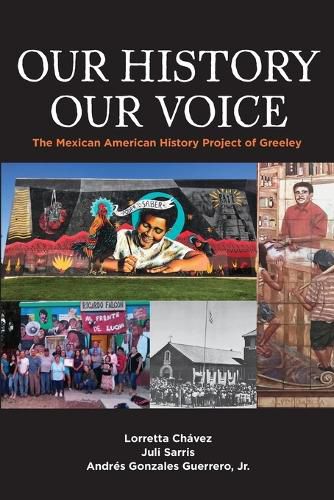Readings Newsletter
Become a Readings Member to make your shopping experience even easier.
Sign in or sign up for free!
You’re not far away from qualifying for FREE standard shipping within Australia
You’ve qualified for FREE standard shipping within Australia
The cart is loading…






This title is printed to order. This book may have been self-published. If so, we cannot guarantee the quality of the content. In the main most books will have gone through the editing process however some may not. We therefore suggest that you be aware of this before ordering this book. If in doubt check either the author or publisher’s details as we are unable to accept any returns unless they are faulty. Please contact us if you have any questions.
In Greeley, Mexican Americans range from recent immigrants to those who lived before this land became part of the United States. There is a saying: We didn't cross the border; the border crossed us. Mexican Americans have called Greeley home for generations and proudly embrace each new generation. Their ancestors were here, cultivating the land, building our neighborhoods, nourishing our families, and driving the industries that shaped Greeley into today's thriving community. From agriculture and meatpacking to construction and oil and gas, their labor has been the foundation of Greeley's prosperity for generations. A vital truth that has too often gone unrecognized. There has never been a book written about the history of Mexican Americans in Greeley, Colorado, using their voices, stories, and perspectives until now. The long-anticipated publication amplifies the lived experiences of Mexican Americans in Greeley from 1920 to today - covering over a century of culture, labor, and legacy. Told through the voices of forty-four narrators, Our History Our Voice is a cultural archive. The book is split into two parts: one offering historical research from Greeley's past and the other featuring oral histories collected from its residents. Topics include immigration, labor in key industries like agriculture and oil and gas, education, civic engagement, and social justice. The authors hope to educate and inspire readers to embrace, celebrate, and share the rich tapestry of their own cultures with others.
$9.00 standard shipping within Australia
FREE standard shipping within Australia for orders over $100.00
Express & International shipping calculated at checkout
This title is printed to order. This book may have been self-published. If so, we cannot guarantee the quality of the content. In the main most books will have gone through the editing process however some may not. We therefore suggest that you be aware of this before ordering this book. If in doubt check either the author or publisher’s details as we are unable to accept any returns unless they are faulty. Please contact us if you have any questions.
In Greeley, Mexican Americans range from recent immigrants to those who lived before this land became part of the United States. There is a saying: We didn't cross the border; the border crossed us. Mexican Americans have called Greeley home for generations and proudly embrace each new generation. Their ancestors were here, cultivating the land, building our neighborhoods, nourishing our families, and driving the industries that shaped Greeley into today's thriving community. From agriculture and meatpacking to construction and oil and gas, their labor has been the foundation of Greeley's prosperity for generations. A vital truth that has too often gone unrecognized. There has never been a book written about the history of Mexican Americans in Greeley, Colorado, using their voices, stories, and perspectives until now. The long-anticipated publication amplifies the lived experiences of Mexican Americans in Greeley from 1920 to today - covering over a century of culture, labor, and legacy. Told through the voices of forty-four narrators, Our History Our Voice is a cultural archive. The book is split into two parts: one offering historical research from Greeley's past and the other featuring oral histories collected from its residents. Topics include immigration, labor in key industries like agriculture and oil and gas, education, civic engagement, and social justice. The authors hope to educate and inspire readers to embrace, celebrate, and share the rich tapestry of their own cultures with others.